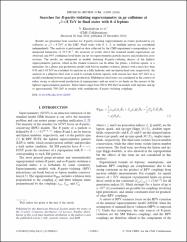Searches for R-parity-violating supersymmetry in pp collisions at root s=8 TeV in final states with 0-4 leptons

View/
Access
info:eu-repo/semantics/openAccessDate
2016Author
Khachatryan, V.Sirunyan, A. M.
Tumasyan, A.
Adam, W.
Asilar, E.
Bergauer, T.
Özdemir, Kadri
CMS Collaboration
Metadata
Show full item recordAbstract
Results are presented from searches for R-parity-violating supersymmetry in events produced in pp collisions at root s = 8 TeV at the LHC. Final states with 0, 1, 2, or multiple leptons are considered independently. The analysis is performed on data collected by the CMS experiment corresponding to an integrated luminosity of 19.5 fb(-1). No excesses of events above the standard model expectations are observed, and 95% confidence level limits are set on supersymmetric particle masses and production cross sections. The results are interpreted in models featuring R-parity-violating decays of the lightest supersymmetric particle, which in the studied scenarios can be either the gluino, a bottom squark, or a neutralino. In a gluino pair production model with baryon number violation, gluinos with a mass less than 0.98 and 1.03 TeV are excluded, by analyses in a fully hadronic and one-lepton final state, respectively. An analysis in a dilepton final state is used to exclude bottom squarks with masses less than 307 GeV in a model considering bottom squark pair production. Multilepton final states are considered in the context of either strong or electroweak production of superpartners and are used to set limits on the masses of the lightest supersymmetric particles. These limits range from 300 to 900 GeV in models with leptonic and up to approximately 700 GeV in models with semileptonic R-parity-violating couplings.
















